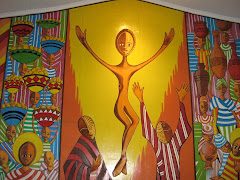
The Cross
The Cross, fundamental law for the life of young people:
Benedict XVI calls upon young people not to "turn back upon themselves." The cross is the only way to build a "Universal Kingdom" of encounter among different cultures. It is also the way of true love, which implies "sacrifice," renunciation," and obedience to the will of God. "He who promises a life without this constantly renewed gift of self deceives people." Vatican City (AsiaNews) - A crowd of at least 40,000 people took part in the first ceremonies for Holy Week, with the celebration of Palm Sunday in St. Peter's Square, presided over by Benedict XVI. Most of them were young people from Rome and various nations, with multicolored T-shirts, hats, shoes, bandannas, and a thicket of palms and olive branches, who had come for the 24th World Youth Day, which this year is celebrated at the diocesan level. Last year, the Day took place at the worldwide level in Sydney (Australia), and in 2011 will be held in Madrid. For this reason, at the end of the celebration Australian young people handed over the Cross of the young people to their Spanish peers. After the long and moving singing of the Passion of Jesus according to St. Mark, the pope addressed the young people with a profound, demanding proposal. Taking his cue from today's celebration, the entry of Jesus into Jerusalem, the pontiff recalled the value of the days in Sydney ("the essential objective was this: We want to see Jesus"), acclaimed, as in today's liturgy, as "he who comes in the name of the Lord," and as the "kingdom of our father David that is to come!" (Mark 11:9f). The pope asked: "Do we understand what is the Kingdom of which He spoke in the interrogation before Pilate? Do we comprehend what it means that this Kingdom is not of this world? Or do we perhaps desire that instead it should be of this world?" "We can recognize two essential characteristics of this Kingdom," he explained. "The first is that this Kingdom passes through the cross . . . the second characteristic says: his Kingdom is universal." But Benedict XVI immediately stressed what makes the kingdom of Jesus Christ different: "[it] is not the rule of a political power, but is exclusively based on the free adherence of love - a love that, for its part, responds to the love of Jesus Christ that is given for all. I think that we must constantly relearn these two things - first of all, universality, catholicity. This means that no one can set up himself, his culture, and his world as absolute. This requires that we all accept one another, renouncing something of our own. Universality includes the mystery of the cross - transcending oneself, obedience to the common word of Jesus Christ in the common Church. Universality is always a transcendence of oneself, the renunciation of something personal. Universality and the cross go together. This is the only way in which peace is created." To the "We want to see Jesus" (John 12:21) - the theme of the Day in Sydney - Jesus responds with his words about the "grain of wheat that dies" (John 12:24), which is "the fundamental law of human existence. 'Whoever loves his life loses it, and whoever hates his life in this world will preserve it for eternal life' (John 12:25). He who wants to have his life for himself, to live only for himself, to clutch everything to himself and exploit all of its possibilities - this is the very person who loses his life. It becomes tedious and empty. Only in the abandonment of oneself, only in the disinterested gift of the 'I' in favor of the 'you', only in the 'yes' to a greater life, proper to God, does our own life become full and great." The pope explained that this principle established by Jesus is in the end the very principle of love: "Love . . . means leaving oneself, giving oneself, not wanting to possess oneself, but becoming free from one's self: not turning back upon oneself - what will become of me - but looking forward, toward the other - toward God and toward the people He sends into my life. And this principle of love, which defines the journey of man, is once again identified with the mystery of the cross, with the mystery of the death and resurrection that we encounter in Christ.""An upright life," the pope specified, "also includes sacrifice, renunciation. He who promises a life without this constantly renewed gift of self deceives people. There is no such thing as a successful life without sacrifice. If I look back over my own life, I must say that precisely the moments in which I said 'yes' to a renunciation were the great and important moments of my life."
:::::::::::::::::::::::::::::::::::::::::::
vmalpan@gmail.com
